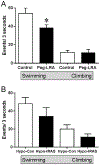Leptin resistance and hippocampal behavioral deficits
- PMID: 28267584
- PMCID: PMC10538552
- DOI: 10.1016/j.physbeh.2017.03.002
Leptin resistance and hippocampal behavioral deficits
Abstract
The adipocyte-derived hormone leptin is an important regulator of body weight and metabolism through activation of brain leptin receptors expressed in regions such as the hypothalamus. Beyond these well described and characterized activities of leptin in the hypothalamus, it is becoming increasingly clear that the central activities of leptin extend to the hippocampus. Indeed, leptin receptors are expressed in the hippocampus where these receptors are proposed to mediate various aspects of hippocampal synaptic plasticity that ultimately impact cognitive function. This concept is supported by studies demonstrating that leptin promotes hippocampal-dependent learning and memory, as well as studies indicating that leptin resistance is associated with deficits in hippocampal-dependent behaviors and in the induction of depressive-like behaviors. The effects of leptin on cognitive/behavioral plasticity in the hippocampus may be regulated by direct activation of leptin receptors expressed in the hippocampus; additionally, leptin-mediated activation of synaptic networks that project to the hippocampus may also impact hippocampal-mediated behaviors. In view of these previous observations, the goal of this review will be to discuss the mechanisms through which leptin facilitates cognition and behavior, as well as to dissect the loci at which leptin resistance leads to impairments in hippocampal synaptic plasticity, including the development of cognitive deficits and increased risk of depressive illness in metabolic disorders such as obesity and type 2 diabetes mellitus (T2DM).
Published by Elsevier Inc.
Figures




Similar articles
-
Obesity/hyperleptinemic phenotype impairs structural and functional plasticity in the rat hippocampus.Physiol Behav. 2011 Nov 30;105(1):138-44. doi: 10.1016/j.physbeh.2011.02.028. Epub 2011 Feb 24. Physiol Behav. 2011. PMID: 21354191 Free PMC article.
-
Leptin enhances NMDA receptor function and modulates hippocampal synaptic plasticity.J Neurosci. 2001 Dec 15;21(24):RC186. doi: 10.1523/JNEUROSCI.21-24-j0001.2001. J Neurosci. 2001. PMID: 11734601 Free PMC article.
-
Leptin regulation of hippocampal synaptic function in health and disease.Vitam Horm. 2021;115:105-127. doi: 10.1016/bs.vh.2020.12.006. Epub 2021 Jan 30. Vitam Horm. 2021. PMID: 33706945 Review.
-
Regulation of hippocampal synaptic function by the metabolic hormone leptin: Implications for health and disease.Prog Lipid Res. 2021 Apr;82:101098. doi: 10.1016/j.plipres.2021.101098. Epub 2021 Apr 22. Prog Lipid Res. 2021. PMID: 33895229 Review.
-
Food for thought: Leptin regulation of hippocampal function and its role in Alzheimer's disease.Neuropharmacology. 2018 Jul 1;136(Pt B):298-306. doi: 10.1016/j.neuropharm.2017.09.038. Epub 2017 Oct 5. Neuropharmacology. 2018. PMID: 28987937 Review.
Cited by
-
Maternal high-fat diet results in cognitive impairment and hippocampal gene expression changes in rat offspring.Exp Neurol. 2019 Aug;318:92-100. doi: 10.1016/j.expneurol.2019.04.018. Epub 2019 Apr 30. Exp Neurol. 2019. PMID: 31051155 Free PMC article.
-
Do Leptin Play a Role in Metabolism-Related Psychopathological Symptoms?Front Psychiatry. 2021 Sep 10;12:710498. doi: 10.3389/fpsyt.2021.710498. eCollection 2021. Front Psychiatry. 2021. PMID: 34566714 Free PMC article.
-
The adipocyte hormone leptin sets the emergence of hippocampal inhibition in mice.Elife. 2018 Aug 14;7:e36726. doi: 10.7554/eLife.36726. Elife. 2018. PMID: 30106375 Free PMC article.
-
Leptin, cardiovascular diseases and type 2 diabetes mellitus.Acta Pharmacol Sin. 2018 Jul;39(7):1176-1188. doi: 10.1038/aps.2018.40. Epub 2018 Jun 7. Acta Pharmacol Sin. 2018. PMID: 29877321 Free PMC article. Review.
-
Ginkgo biloba extract (GbE) attenuates obesity and anxious/depressive-like behaviours induced by ovariectomy.Sci Rep. 2021 Jan 8;11(1):44. doi: 10.1038/s41598-020-78528-3. Sci Rep. 2021. PMID: 33420094 Free PMC article.
References
-
- Frederich RC, Hamann A, Anderson S, Lollmann B, Lowell BB, Flier JS, Leptin levels reflect body lipid content in mice: evidence for diet-induced resistance to leptin action, Nat. Med 1 (1995) 1311–1314. - PubMed
-
- Lord GM, Matarese G, Howard JK, Baker RJ, Bloom SR, Lechler RI, Leptin modulates the T-cell immune response and reverses starvation-induced immunosuppression, Nature 394 (1998) 897–901. - PubMed
-
- Bjorbaek C, Kahn BB, Leptin signaling in the central nervous system and the periphery, Recent Prog. Horm. Res 59 (2004) 305–331. - PubMed
-
- Ahima RS, Prabakaran D, Mantzoros C, Qu D, Lowell B, Maratos-Flier E, Flier JS, Role of leptin in the neuroendocrine response to fasting, Nature 382 (1996) 250–252. - PubMed
Publication types
MeSH terms
Substances
Grants and funding
LinkOut - more resources
Full Text Sources
Other Literature Sources
Medical

